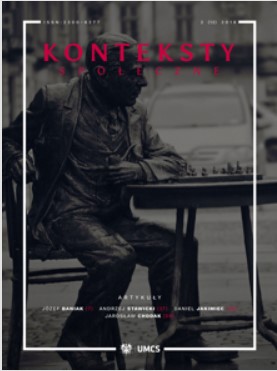Ewaluacja konstruktywistyczna – zastosowanie, mocne strony i ograniczenia podejścia. Na przykładzie ewaluacji programu Bardzo Młoda Kultura
Constructive evaluation - application, strengths and limitations of the approach. Based on the example of the Very Young Culture program evaluation
Author(s): Andrzej StawickiSubject(s): Methodology and research technology, Sociology of Culture, Sociology of Education
Published by: Wydawnictwo Naukowe Uniwersytetu Marii Curie-Sklodowskiej
Keywords: fourth generation evaluation; cultural education; triangulation;
Summary/Abstract: The paper includes the description of the experience gained during the evaluation of the Very Young Culture program (Bardzo Młoda Kultura – BMK). Very Young Culture is an innovative program whose main goal is to strengthen the organizations operating in the field of cultural education and create trans-sectoral network of entities cooperating in this field. The long term goal was to shape young people’s open attitudes, tolerance and the ability to participate critically in culture. The program’s innovation lies in the way it was managed. The author of the program is prof. Marek Krajewski from the University of Adam Mickiewicz in Poznań. The program had a nationwide range and was carried out at the regional level. The coordinator of the program was the National Center for Culture and the Ministry of Culture and National Heritage. The program operated on three levels - central, regional and local, and each of them provided for the implementation of an evaluation study. This article refers to the regional part of the BMK program carried out in the Lubelskie Voivodeship. The evaluation research used the triangulation of both qualitative and quantitative methods to better capture the value of the program from the perspective of different stakeholders. The method of evaluation based on the theory of the program with the dominance of qualitative methods was used. The evaluation was continuous and was intended as a learning mechanism in the implementation of the program. The problem in the evaluation of the program was the immeasurability of long-term results. For example, it was difficult to express the value of social and cultural capital, which were strengthened as a result of the program. In view of such long-term goals, an evaluation was based on short-term variables, such as the self-assessment of competences acquired by the program participants and the resulting cooperation network. The article will present the best solutions for measuring the results of the program realized in the field of culture and the proposal to measure long-term results based on existing data banks from various social research cases. The studies used a constructivist approach to evaluation. The experience gained allows to formulate conclusions regarding strengths and limitations of this approach.
Journal: Konteksty Społeczne
- Issue Year: 6/2018
- Issue No: 2 (12)
- Page Range: 37-47
- Page Count: 11
- Language: Polish

